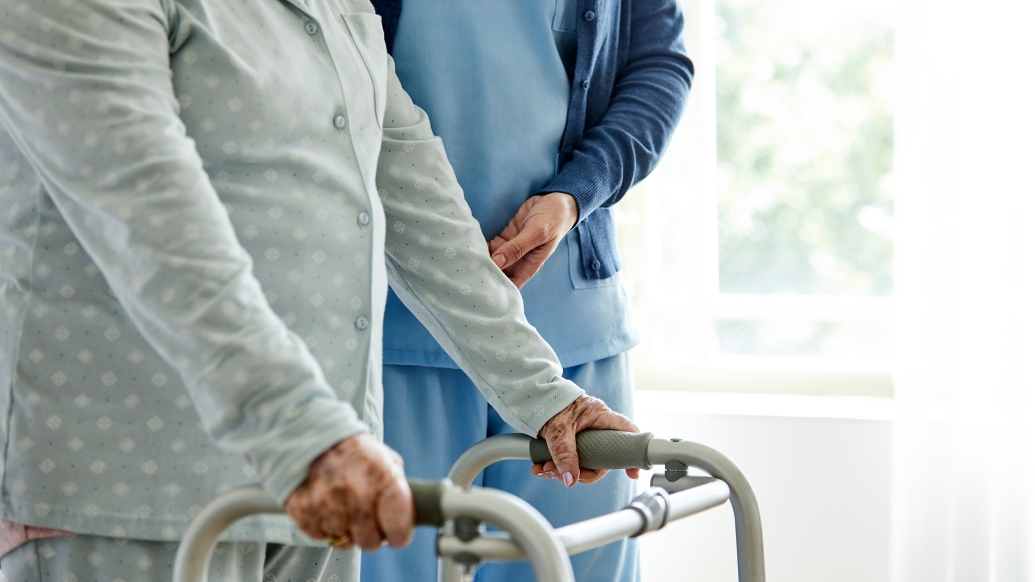Older adults need far more help with daily activities, and are less mentally sharp, for months after infection
1:58 PM
Author |

COVID-19 raced through nursing homes many times over the past few years, as the virus spread rapidly among vulnerable older adults living close together.
But a study shows the virus can leave a lasting impact too – making the older adults who live in these facilities more dependent on staff to help them with basic daily activities for months after their infection.
They also experience a decline in their brain function.
These “long COVID” effects came to light in a detailed analysis led by researchers from Michigan Medicine, the University of Michigan’s academic medical center.
They compared a group of nursing home residents who had COVID-19 with a similar group who had not, and looked at their physical and mental functioning for up to a year.
On average, nursing home residents who caught COVID-19 and survived had effects that lasted about nine months. In addition, 30% of those who had a confirmed case of COVID-19 died during the study follow-up period, more than twice the percentage that died in the comparison group.
SEE ALSO: High-risk antibiotic use common in nursing homes after hospitalization
The results are published in the Journal of the American Geriatrics Society by a team led by former U-M geriatrics fellow Sophie Clark, M.D., now at the University of Colorado, and Lona Mody, M.D., M.Sc., interim chief of the division of geriatrics and palliative medicine at the U-M Medical School, and staff physician at VA Ann Arbor Healthcare System.
The study’s authors also included Lillian Min, M.D., M.S.H.S., a geriatrician and, like Mody, a member of the U-M Institute for Healthcare Policy and Innovation.
Comparing two groups over time
The researchers looked at data from two Michigan nursing homes, focusing on residents who lived there between 2019 and 2022.
They were able to study full data on 90 nursing home residents who tested COVID-19 positive on a PCR test between March 2020 and October 2021, and 81 residents who lived in the same nursing homes during that time but did not test positive.
The majority were women, over age 80 and were white and non-Hispanic.
Half had dementia, and all had multiple chronic health conditions.
Nearly all of those who had COVID during the study period were unvaccinated at the time they got infected.
The team looked at the patients’ scores on two standard scales that nursing homes use to measure residents’ physical and mental functioning, and report in a system called the Minimum Data Set.
Nursing home residents who had had COVID-19 experienced new decline in their function and needed substantially more help with daily activities after their acute infection period, lasting for months."
- Lona Mody, M.D., M.Sc.
The researchers examined each patient’s scores from before the pandemic and over the next year.
They had at least four quarterly measurements for each one, showing how much assistance they needed for daily activities such as dressing, going to the toilet and bathing, and how they scored on basic cognitive tasks such as repeating and recalling words, and knowing what year, month and day it is.
“Before the pandemic, the two groups scored about the same on both their need for help with activities of daily living, or ADL, and their cognitive status,” said Clark.
“But the patients who tested positive for COVID showed a sudden decline in both measurements that lasted long after their infection.”
Rapid decline and some recovery
“Nursing home residents who had had COVID-19 experienced new decline in their function and needed substantially more help with daily activities after their acute infection period, lasting for months,” said Mody.
“This places an even greater burden on nursing home staff, who are already stretched thin.”
The good news was that COVID survivors without dementia gradually regained their ability to do daily activities, and were nearly on par with the uninfected group by the end of a year post-infection.
Those with dementia continued to decline, faster than their peers who had dementia but had not had COVID-19.
On the cognitive test, patients showed a rapid decline immediately after COVID infection, and stayed far below the uninfected group for months -- though both groups had about the same cognitive results by the end of a year.
The researchers note that the measures taken to protect nursing home residents from coronavirus infections in 2020 and 2021, including reducing visiting options and social activities, may have contributed to the overall decline in both groups.
The researchers note that recent data shows that COVID vaccination can reduce the risk of long COVID.
So the experience of the patients in their study (who mostly caught COVID before vaccines were available) may not match what is happening today in vaccinated nursing home residents.
“This is especially true for those who have gotten the updated vaccine that became available in September,” said Mody.
“We encourage all nursing home residents and staff, and the family members who visit these homes, to get vaccinated and help prevent more cases of acute and long COVID in this especially vulnerable population.”
The study was funded by the Agency for Healthcare Research and Quality (HS25451), the NIH National Institute on Aging (K24AG050685), and the Michigan Institute for Clinical and Health Research and the Veterans Affairs Ann Arbor Healthcare System.
In addition to Clark, Mody and Min, the study’s authors are Liza Bautista, M.D., Karen Neeb M.S.N., C.N.P., Ana Montoya, M.D., M.P.H., Kristen E. Gibson, M.P.H., Julia Mantey, M.P.H., and Mohammed Kabeto M.S.
Reference: “Post-acute sequelae of SARS-CoV-2 (PASC) in nursing home residents: A retrospective cohort study,” J Am Geriatr. DOI: 10.1111/jgs.18678

Explore a variety of healthcare news & stories by visiting the Health Lab home page for more articles.

Department of Communication at Michigan Medicine
Want top health & research news weekly? Sign up for Health Lab’s newsletters today!





